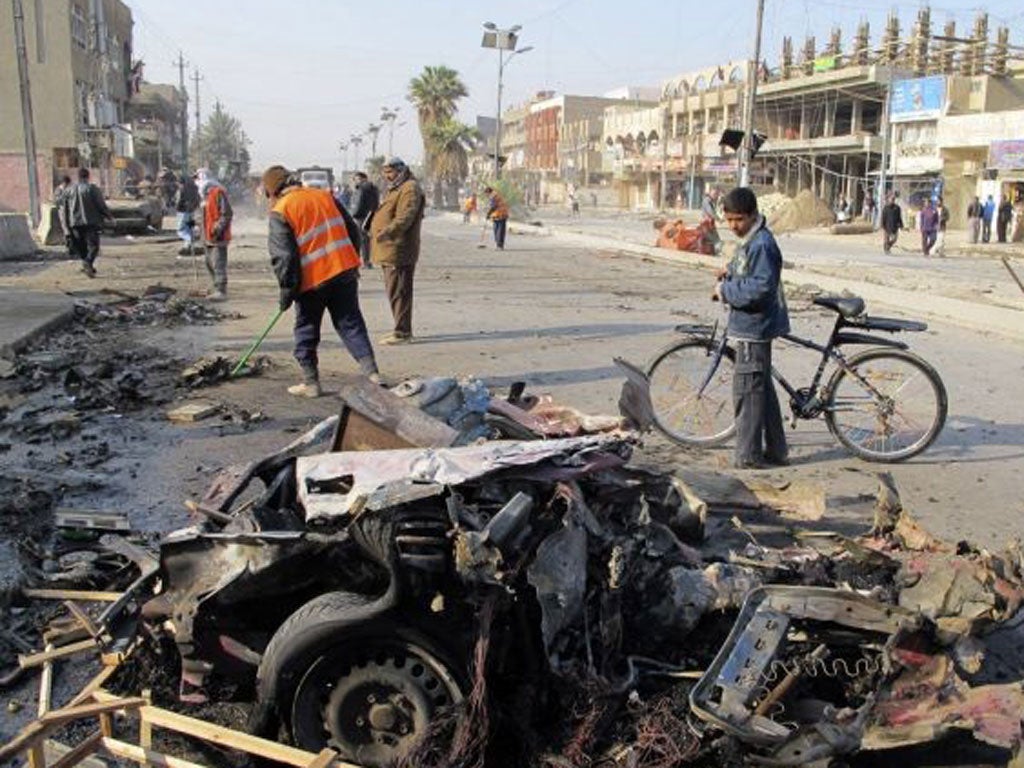Wave of bombings across Iraq kills at least 63

Your support helps us to tell the story
From reproductive rights to climate change to Big Tech, The Independent is on the ground when the story is developing. Whether it's investigating the financials of Elon Musk's pro-Trump PAC or producing our latest documentary, 'The A Word', which shines a light on the American women fighting for reproductive rights, we know how important it is to parse out the facts from the messaging.
At such a critical moment in US history, we need reporters on the ground. Your donation allows us to keep sending journalists to speak to both sides of the story.
The Independent is trusted by Americans across the entire political spectrum. And unlike many other quality news outlets, we choose not to lock Americans out of our reporting and analysis with paywalls. We believe quality journalism should be available to everyone, paid for by those who can afford it.
Your support makes all the difference.A wave of bombings has hit Baghdad, killing at least 63 people in the worst violence Iraq has seen for months.
The apparently co-ordinated attacks struck days after the last American forces left Iraq and in the midst of a major government crisis between the country's top Shiite and Sunni political leaders.
The bombings may be linked more to the US withdrawal than the political crisis, but the developments heighten fears of a new round of sectarian bloodshed like the one a few years ago that pushed Iraq to the brink of civil war.
There was no immediate claim of responsibility. But the bombings bore all the hallmarks of an attack by the Sunni insurgents of al-Qai'da.
Most of the violence appeared to hit Shiite neighbourhoods, although some Sunni areas were also targeted.
In all, 11 neighbourhoods were hit by either car bombs, roadside blasts or sticky bombs attached to cars. At least one of the attacks was a suicide bombing and the blasts went off over several hours.
The worst blast was in the Karrada neighbourhood, where a suicide bomber driving an explosives-laden vehicle blew himself up outside the office of a government agency fighting corruption.
Two police officers at the scene said the bomber was driving an ambulance and told guards that he needed to get to a nearby hospital. After the guards let him through, he drove to the building where he blew himself up.
Sirens wailed as ambulances rushed to the scene and a large plume of smoke rose over the area. The blast left a crater about five yards (metres) wide in front of the five-storey building, which was singed and blackened.
"I was sleeping in my bed when the explosion happened," said 12-year-old Hussain Abbas, who was standing nearby in his pyjamas. "I jumped from my bed and rushed to my mother's lap. I told her I did not to go to school today. I'm terrified."
At least 25 people were killed and 62 injured in that attack, officials said.
Figures gathered from Iraqi health and police officials across the city put the death toll at 60, and 160 injured.
Iraqis are already used to horrific levels of violence, but many wondered when they would be able to enjoy some measure of security and stability after years of chaos.
"My baby was sleeping in her bed. Shards of glass have fallen on our heads. Her father hugged her and carried her. She is now scared in the next room," said one woman in western Baghdad. "All countries are stable. Why don't we have security and stability?"
While Baghdad and Iraq have become much safer over the years, explosions like today's are still commonplace. They come at a precarious time in Iraq's political history.
The government of Prime Minister Nouri al-Maliki this week accused Sunni Vice President Tariq al-Hashemi of running a hit squad that targeted government officials and put out a warrant for his arrest. Al-Maliki is also pushing for a vote of no-confidence against another Sunni politician, the deputy prime minister Saleh al-Mutlaq.
Many Sunnis fear that this is part of a wider campaign to go after Sunni political figures in general and shore up Shiite control across the country at a critical time when all American troops have left Iraq.
Ayad Allawi, who heads a Sunni-backed party called Iraqiya, laid the blame for today's violence with the government.
The Iraqiya coalition also includes al-Hashemi and al-Mutlaq, and Allawi has been one of al-Maliki's strongest critics. Allawi warned that violence would continue as long as people are left out of the political process.
"We have warned long ago that terrorism will continue ... against the Iraqi people unless the political landscape is corrected and the political process is corrected, and it becomes an inclusive political process and full blown non-sectarian institutions will be built in Iraq," Allawi said.
AP
Join our commenting forum
Join thought-provoking conversations, follow other Independent readers and see their replies
Comments